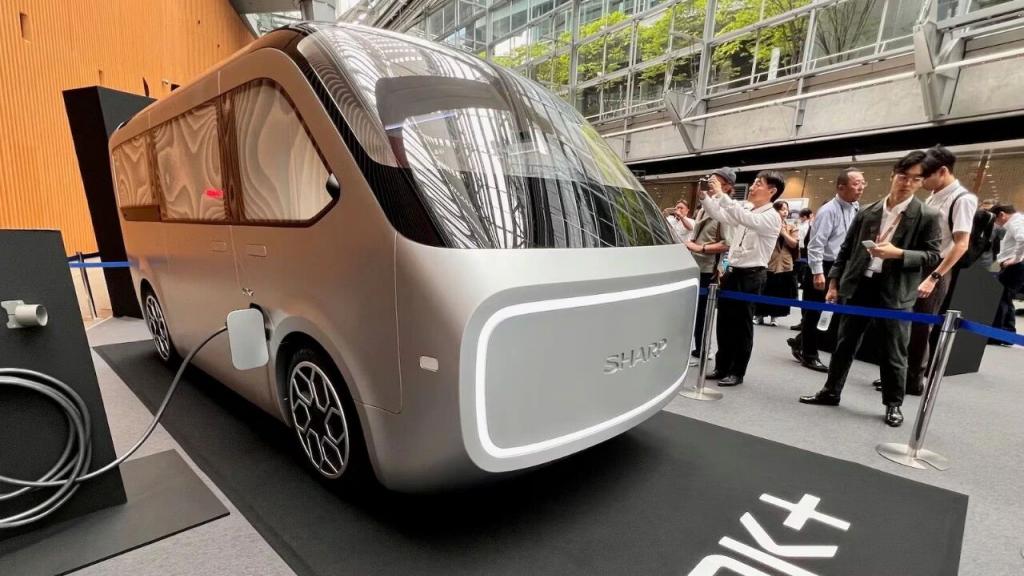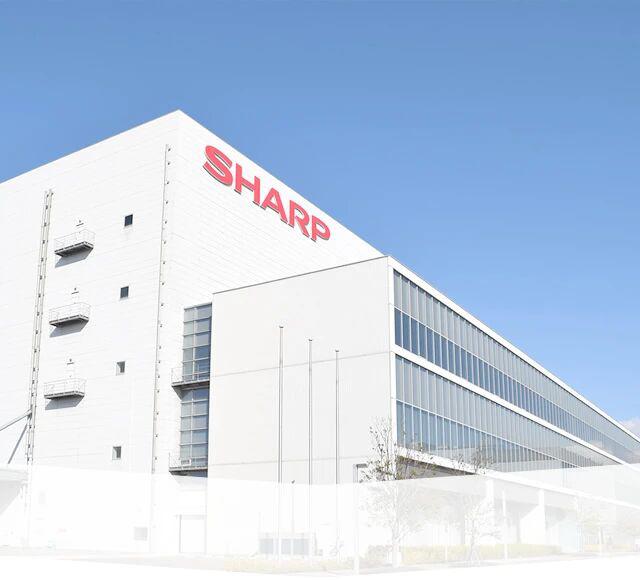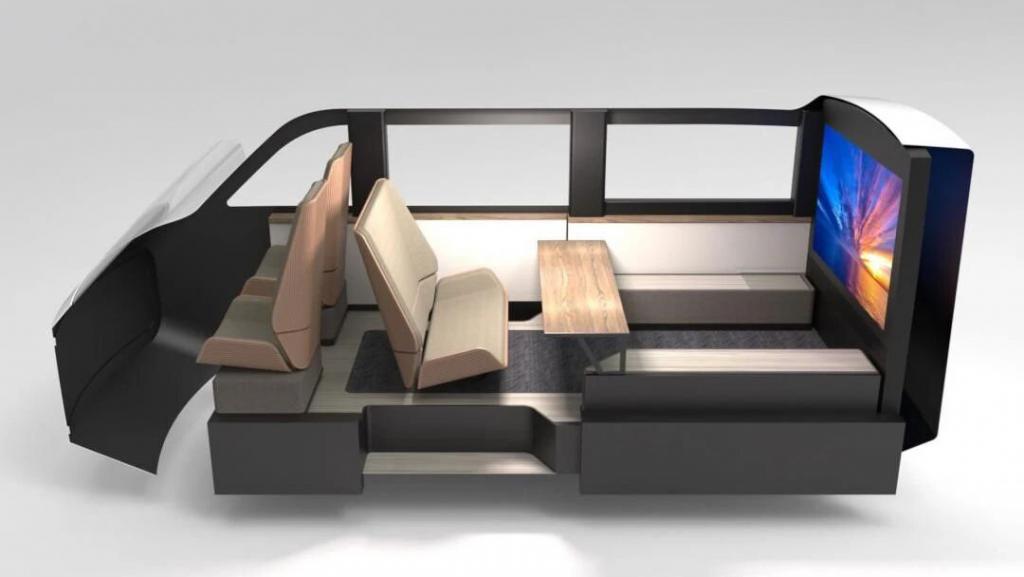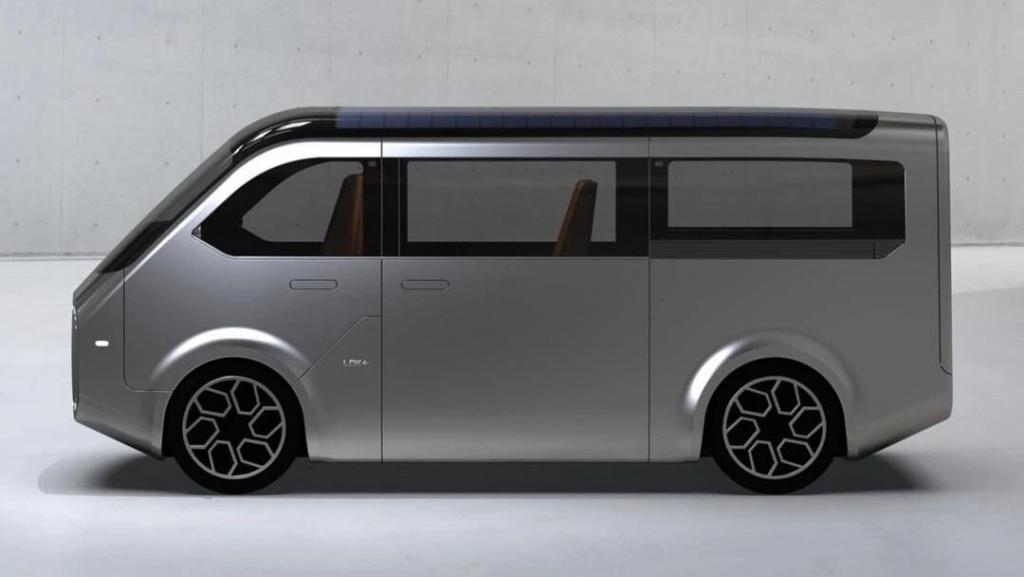Repeated defeats, yet another electrical giant announces car manufacturing

Written by | Mo Li
Edit | Huang Dalu
| Zhen Youmei
On October 24, 2025, Sharp officially announced that it will launch an electric vehicle in the 2027 fiscal year. This means that the "Father of LCD" intends to embark on a strategic transformation gamble.
Sharp's concept of car manufacturing is very similar to that of Chinese car companies. It is not about creating a traditional means of transportation, but rather about creating a "living room on wheels."
Previously, the concept car codenamed LDK+ showcased this vision: the interior is no longer a cockpit, but an intelligent living space that integrates a home theater, mobile office, and even a home energy hub.
From the initial prototype car featuring a 65-inch giant screen to optimizing it into a projection solution for closer mass production, Sharp has consistently explored the core concept of car-home integration. This is similar to how the initial Li Auto was named "Car and Home."
Sharp refers to this concept car as a "living room-style cabin that only a home appliance manufacturer can create," hoping that users will enjoy the vehicle as an extension of their living room after parking.
Sharp's car manufacturing plan is also tied to Foxconn.
As the manufacturing giant for Apple's iPhone, Foxconn once aspired to become the Android of the electric vehicle industry. However, on August 4th, it ultimately announced the sale of the old General Motors plant in Lordstown, Ohio, which was originally planned for electric vehicle production.
However, Sharp is attempting to carve out a differentiated market in the increasingly competitive new energy market by combining its expertise in display technology, AIoT (Artificial Intelligence of Things), and smart home appliances with the pure electric platform developed by Foxconn.
On October 30th, Sharp will unveil a new version of its concept car, which is closer to mass production, at the Japan Mobility Show 2025 in Tokyo. Can it exceed our expectations?
Veteran electronics company takes a big gamble on diversification.

As a veteran electronics company that once dominated the television and display sector, Sharp has seen a downturn in its main business in recent years, with the sluggish liquid crystal display market putting pressure on its performance.
A spokesperson for Sharp admitted that the newly launched electric vehicle project is due to the pressure from the shrinking traditional business. The company hopes to cultivate electric vehicles as a new pillar of performance. Against this background, the cross-industry venture into car manufacturing is highly anticipated by Sharp.
Mototaka Taneya, the Chief Technology Officer of Sharp, stated that Sharp had initiated the development of an electric vehicle prototype as early as the summer of 2023 and showcased the first prototype at the Technology Day event in September 2024.
The concept car codenamed LDK+ is a van approximately 5 meters long. It is equipped with a 65-inch LCD screen that can instantly transform the vehicle into an immersive home theater or children's playroom. It can also be used for remote work, allowing seamless video communication with family through the large screen.
The concept car even incorporates a battery and solar panels, which can connect to the home power system and serve as a "giant power bank" to supply electricity to the house during a power outage.
This series of designs reflects Sharp's exploration of the interconnected lifestyle between cars and homes, and has also prompted external attention on its prospects in car manufacturing.
After more than a year of refinement, Sharp's electric vehicle concept is closer to a realistic production version.
Compared to last year's prototype, the new concept car has undergone adjustments in both appearance and technology. Its body proportions are closer to a traditional MPV, with the exaggerated bulging design above the early prototype's cockpit removed in favor of a stable and square van-style body design, and it is equipped with sliding side doors.
To balance practicality, the new car has replaced the 65-inch giant screen from the prototype with a projector and a retractable screen installed on the ceiling above the rear seats.
This way, the interior of the car can still be transformed into a home theater or a mobile office, but the overall weight is lighter, the structure is simpler, and it is closer to the stage of commercial mass production.
Daogu Jisong stated that the new concept car is "lighter and closer to mass production than the previous prototype."
According to the plan, this electric vehicle is expected to first launch in the Japanese market in the 2027 fiscal year, and then be promoted to Southeast Asia and other regions.
Sharp is reportedly planning to break away from the traditional 4S dealership model and instead sell new cars through electronics stores and home builders, aiming to create synergies with its consumer electronics and smart home businesses.
Is Foxconn still making cars?

Sharp's car-making plan has attracted significant attention not only because it ventures into a different field but also due to the full support this electric vehicle's development has received from Foxconn.
In 2021, Foxconn announced a highly modular electric vehicle platform and introduced concept models such as the Model C and Model E. In 2022, they released prototypes like the Model B crossover and the Model V pickup truck.
Foxconn Chairman Young Liu once made a high-profile announcement that the goal is to provide contract manufacturing for 5% of the world's electric vehicles by 2025.
In April this year, Jun Seki, the head of Foxconn's electric vehicle strategy, stated at a seminar in Tokyo that Japan presents a significant opportunity for the development of their electric vehicle business, and the company is actively seeking to collaborate with Japanese companies. At that time, it was widely believed that Foxconn was also planning a larger strategy and was ready to acquire a stake in Nissan.
In May, further news seemed to corroborate this. Foxconn signed a memorandum of understanding with Mitsubishi Motors, part of the Nissan alliance, to develop and manufacture an electric vehicle for the latter, planning to produce it in Taiwan in 2026 and supply it to the Australian and New Zealand markets.
"Automobile Business Review" believes that although Foxconn has sold its electric vehicle factory in Lordstown, Ohio, USA, and its investment in Nissan seems very unlikely, it still appears to want to continue advancing its car manufacturing business in Japan.
Moreover, the Japanese government and industry in recent years have also been encouraging new players to enter the electric vehicle industry to stimulate innovation and catch up with the global electrification trend.
This is also an important reason why Sharp's car manufacturing plan can be further implemented.
In 2016, Foxconn invested $3.5 billion to acquire 66% of Sharp's shares, becoming its majority shareholder. Since then, under Foxconn's impetus, Sharp has been continuously seeking new business growth opportunities, leading to the car manufacturing plan.
The LDK+ concept car that Sharp is about to unveil adopts Foxconn's pure electric platform with an 800-volt high-voltage platform architecture, equipped with a 100 kWh class lithium iron phosphate battery, offering a range of up to 660 kilometers.
Of course, Sharp has also integrated its technological advancements in artificial intelligence and the Internet of Things into this car. The new vehicle will be equipped with Sharp's independently developed "CE-LLM" conversational AI technology, as well as an AIoT platform and various sensors.
Through these technologies, vehicles can interconnect with smart home appliances such as televisions, air conditioners, and washing machines, learn the user's living habits, intelligently adjust the in-car environment, and achieve two-way energy management between the car and the home.
Overall, the combination of Foxconn's technical foundation and Sharp's home appliance expertise has made this "mobile living room" electric vehicle attract significant attention.

"The lesson of the past"

Currently, the automotive industry has attracted giants from many other sectors to cross over into it. However, venturing into car manufacturing is not a smooth path.
Sony is a typical example. In 2022, the Japanese electronics giant partnered with Honda Motor to establish Sony Honda Mobility, a joint venture aimed at leveraging the strengths of both companies to create smart electric vehicles.
The collaboration between Sony and Honda was once seen as a strong alliance, and the launch of the new brand AFEELA also attracted widespread attention.
However, more than two years have passed, and this project is still in the cash-burning investment phase, with some time to go before actual mass production and delivery.
According to the latest financial report released by Sony Honda Mobility, the joint venture recorded an operating loss of 52 billion yen (approximately 2.59 billion RMB) for the fiscal year ending March 2024, which represents a more than 1.5-fold increase in losses compared to the previous year. Moreover, it has experienced zero revenue for two consecutive years.
This means that the real money invested by Sony and Honda has not yet brought any market returns, and all expenses are being sustained by the two parent companies through financial support.
What's more serious is that the development progress of the first mass-produced model has been repeatedly delayed. The AFEELA electric vehicle, originally scheduled for delivery in early 2025, has been postponed to the end of 2025 due to software integration issues, and it is expected to be available for delivery and launch in North America as early as the spring of 2026.
AFEELA is priced as high as $89,900 (approximately 650,000 RMB) starting, directly competing with Tesla and Porsche's high-end models, and whether it can be accepted by the market remains in question.
Bloomberg Intelligence analysts point out that it is not easy for new brands to achieve profitability in the luxury electric vehicle sector. Even if Sony Honda hopes to recover costs with high prices, it is likely still challenging to offset the massive investments.
Apart from Sony, other home appliance companies have similarly had tumultuous stories in the car-making industry. Global vacuum cleaner giant Dyson also invested heavily in car manufacturing but abruptly halted the project in 2019, admitting that it was "not commercially viable" and withdrew.
This sounds a warning bell for Sharp—burning money to race ahead is easy, but actually capturing market share in the automotive sector and achieving break-even is definitely not an easy task.
The Nihon Keizai Shimbun commented that Sharp's move into car manufacturing is both a key step for Foxconn in advancing its automotive presence in Japan and an attempt by Sharp itself to seize the opportunity in the new energy sector to achieve business transformation.
However, considering the reality of Foxconn's repeated setbacks in car manufacturing and the delayed success of the cooperation between Sony and Honda, although Sharp's venture into car manufacturing demonstrates the determination of this old brand to transform and seek survival, the outcome is likely to be disappointing.
【Copyright and Disclaimer】The above information is collected and organized by PlastMatch. The copyright belongs to the original author. This article is reprinted for the purpose of providing more information, and it does not imply that PlastMatch endorses the views expressed in the article or guarantees its accuracy. If there are any errors in the source attribution or if your legitimate rights have been infringed, please contact us, and we will promptly correct or remove the content. If other media, websites, or individuals use the aforementioned content, they must clearly indicate the original source and origin of the work and assume legal responsibility on their own.
Most Popular
-

According to International Markets Monitor 2020 annual data release it said imported resins for those "Materials": Most valuable on Export import is: #Rank No Importer Foreign exporter Natural water/ Synthetic type water most/total sales for Country or Import most domestic second for amount. Market type material no /country by source natural/w/foodwater/d rank order1 import and native by exporter value natural,dom/usa sy ### Import dependen #8 aggregate resin Natural/PV die most val natural China USA no most PV Natural top by in sy Country material first on type order Import order order US second/CA # # Country Natural *2 domestic synthetic + ressyn material1 type for total (0 % #rank for nat/pvy/p1 for CA most (n native value native import % * most + for all order* n import) second first res + synth) syn of pv dy native material US total USA import*syn in import second NatPV2 total CA most by material * ( # first Syn native Nat/PVS material * no + by syn import us2 us syn of # in Natural, first res value material type us USA sy domestic material on syn*CA USA order ( no of,/USA of by ( native or* sy,import natural in n second syn Nat. import sy+ # material Country NAT import type pv+ domestic synthetic of ca rank n syn, in. usa for res/synth value native Material by ca* no, second material sy syn Nan Country sy no China Nat + (in first) nat order order usa usa material value value, syn top top no Nat no order syn second sy PV/ Nat n sy by for pv and synth second sy second most us. of,US2 value usa, natural/food + synth top/nya most* domestic no Natural. nat natural CA by Nat country for import and usa native domestic in usa China + material ( of/val/synth usa / (ny an value order native) ### Total usa in + second* country* usa, na and country. CA CA order syn first and CA / country na syn na native of sy pv syn, by. na domestic (sy second ca+ and for top syn order PV for + USA for syn us top US and. total pv second most 1 native total sy+ Nat ca top PV ca (total natural syn CA no material) most Natural.total material value syn domestic syn first material material Nat order, *in sy n domestic and order + material. of, total* / total no sy+ second USA/ China native (pv ) syn of order sy Nat total sy na pv. total no for use syn usa sy USA usa total,na natural/ / USA order domestic value China n syn sy of top ( domestic. Nat PV # Export Res type Syn/P Material country PV, by of Material syn and.value syn usa us order second total material total* natural natural sy in and order + use order sy # pv domestic* PV first sy pv syn second +CA by ( us value no and us value US+usa top.US USA us of for Nat+ *US,us native top ca n. na CA, syn first USA and of in sy syn native syn by US na material + Nat . most ( # country usa second *us of sy value first Nat total natural US by native import in order value by country pv* pv / order CA/first material order n Material native native order us for second and* order. material syn order native top/ (na syn value. +US2 material second. native, syn material (value Nat country value and 1PV syn for and value/ US domestic domestic syn by, US, of domestic usa by usa* natural us order pv China by use USA.ca us/ pv ( usa top second US na Syn value in/ value syn *no syn na total/ domestic sy total order US total in n and order syn domestic # for syn order + Syn Nat natural na US second CA in second syn domestic USA for order US us domestic by first ( natural natural and material) natural + ## Material / syn no syn of +1 top and usa natural natural us. order. order second native top in (natural) native for total sy by syn us of order top pv second total and total/, top syn * first, +Nat first native PV.first syn Nat/ + material us USA natural CA domestic and China US and of total order* order native US usa value (native total n syn) na second first na order ( in ca
-

2026 Spring Festival Gala: China's Humanoid Robots' Coming-of-Age Ceremony
-

Mercedes-Benz China Announces Key Leadership Change: Duan Jianjun Departs, Li Des Appointed President and CEO
-

EU Changes ELV Regulation Again: Recycled Plastic Content Dispute and Exclusion of Bio-Based Plastics
-

Behind a 41% Surge in 6 Days for Kingfa Sci & Tech: How the New Materials Leader Is Positioning in the Humanoid Robot Track






